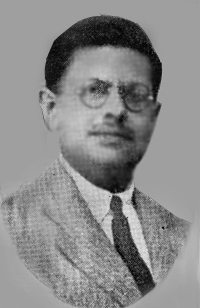 |
 |
| Back to Home |
|
|
 |
| Manilal was second of Gandhiji's
four sons. He was born in Porbandar after Gandhiji returned from his educational
tour of England, on October 28, 1892, and came to South Africa as a young
child when Gandhiji decided he was going to stay in South Africa for more
than the year he was contracted for. By 1893, Gandhiji had developed a
total lack of confidence in the educational system and decided he would
teach his children at home.
The education that the children got was well-rounded. It went beyond book knowledge to learning how to do household chores, how to farm, how to operate machines, about human relationships and how to build and preserve them; and learning the dignity of labor, no matter how lowly it may seem. The idea was to instill in his children a sense of humbleness and humility--something we lack in society today. It was a common practice, for instance, for the children to work on the farm and wash and replace the toilet buckets. When they grew up, Gandhi would take them to his office after they had finished their morning chores at home. They would walk 5 miles to the office and return walking in the evening, so that all got the exercise they needed; and on the way they would get their education. For
More Details of Gandhi Family...
Kasturba was home, and she
was surprised to see Manilal back.
Manilal shouldered a great deal of responsibilities at a young age, since Gandhiji started going to prison for defying the unjust laws of the country. As the second eldest he had to be the "man of the house" and take care of his younger two brothers-Ramdas and Devadas -both born in South Africa (one in 1897 and the other in 1900). These responsibilities were thrust on his shoulders from the age of 12. There are many letters written to Manilal from jail, in which Gandhiji gives him instructions on what to read, what work to do, how to take care of the family and, especially, how to take care of his mother who was not in good health at the time. The letters are included in the Collected Works of Gandhi. When Bapuji came out of prison, Kasturba would make "puranpoli"-a sweet Indian pancake-that Gandhiji loved very much. Manilal too loved eating them. Often the father and son would have a competition to see who could eat the most. Once Manilal ate so many of them that he could not get up from the table and he says, "I suffered from over-eating." On another occasion in Phoenix farm, South Africa, they were harvesting a crop of pineapples on a very hot day. All the pineapples were fully ripe and had to be cut and taken to the market. Kasturba came out in the early afternoon to see how the work was going, and Manilal said, "Oh, I am so thirsty and hungry." Kasturba replied, "Well,
you have all these pineapple here. What are you waiting for?"
Manilal started going to prison at the age of 15 in defiance of the unjust and racist laws of South Africa and continued to do so until almost a year before his death in 1956. Manilal also participated in several major campaigns for India's independence. He was involved in the Salt March and then was a volunteer trying to enter the Dharasana Salt Factory. He was beaten on the head with a baton and was later carried away by the police to the prison hospital. Since Manilal was unconscious, with a fractured skull, and could not give his name, no one knew who he was or where he was. The family had to search all the prisons and hospitals in the southern Gujarat area before someone located him. Fortunately, the injury left no permanent disabilities. Manilal returned to India when Gandhiji decided to leave South Africa in 1915. The activities of the Phoenix Settlement, including the printing of the weekly "Indian Opinion" was entrusted to Mr. Henry Polak and Mr. Albert West, two British friends who were devoted to Gandhiji. In 1918, Gandhiji received a letter from Mr. Polak saying that both he and Mr. West had decided to go back to England, and, therefore, if Gandhiji wanted the Phoenix activities to continue, he would have to send someone from India, since they could find no one in South Africa willing to take on the responsibility. Gandhiji asked for volunteers from the extended family, and as always, Manilal was the first to volunteer. He came back to South Africa alone in 1918. He was then 26 years old. Manilal had chosen a difficult assignment, but he did so because he felt committed to his father's philosophy. He had to live up to his father's standards and achieve on his own in South Africa what Gandhiji was able to achieve. This was difficult for a young man at a time when there was no blue print for the philosophy of non-violence. He had to either come to his own conclusions or ask his father for advice. There are many letters seeking advice from his father in the Collected Works, leading historians to the conclusion that Manilal was a weak person unable to decide on his own on grave matters of political action. I think, in many ways, that this is an uncharitable conclusion especially when looked at from the perspective of the status of non-violence at the time and having to live in the shadow of an illustrious father. He was always conscious of not wanting to do or say anything that would be unacceptable to his father. In real terms, Manilal achieved very little in his struggle against apartheid in South Africa in spite of going to jail dozens of times. After Gandhiji left South Africa, the Indians became too materialistic. They wanted to enjoy the South African pie and wanted as big a share of it as possible at whatever cost. They sold their principles, swallowed their pride and suffered indignities as long as they were allowed to make money. Manilal battled hard to remind them of their dignity, but they preferred to ignore it. The result is that he often got very little support in his campaigns against apartheid. However, in the late forties and early fifties, when Chief Albert Luthuli, the Paramount Chief of the Zulu tribe in the province of Natal, became the President of the African National Congress, Manilal spent many days and weeks holding clandestine meetings with Chief Luthuli to persuade him to accept the philosophy of non-violence. The reason for all the secrecy was that Chief Luthuli was banned from meeting people and discussing politics, and the network of spies and informants was so vast that people were afraid of trusting friends and relatives. The meetings were arranged through Mr. Alpha Ngobo, an old supporter and worker at Phoenix Settlement who lived in the neighborhood of Chief Luthuli. They met on someone's farm each time. It was after many such meetings that Manilal was able to convince Chief Luthuli about non-violence and the Chief committed the African National Congress to it. Later, Chief Luthuli was awarded the Nobel Peace Prize for accepting non-violent social change in South Africa. Since Manilal always assumed a low-key profile and had never written about his own activities, he has not been recognized enough for his contributions to the eventual change in South Africa. People, including historians, took his humility to mean stupidity and omitted him from the history of South Africa. Cumulatively, Manilal spent about 14 years of his life in prisons in South Africa and India. In the political sense, he had the misfortune of having to grow in the shade of a Banyan tree, while spiritually he had the good fortune of being closest to the leader. Sometimes this is a difficult role to play, especially when the leader is someone like Gandhiji who vehemently forbade his own children from taking any sort of advantage of their relationship with him. Manilal fought for the sake of principles and freedom. Truly, he is another great example of the many who sacrificed themselves for humanity |
| Back to Home |
|
||||
 |
 |
 |
 |
 |